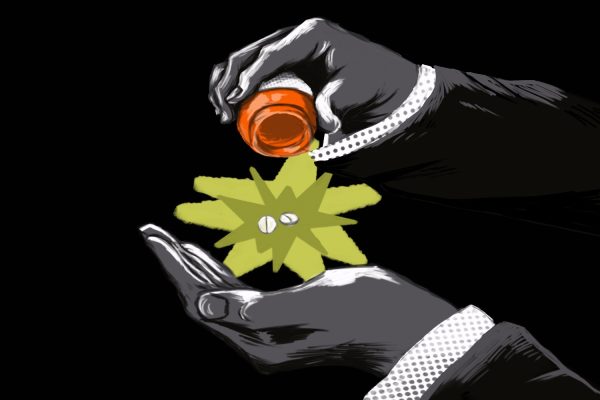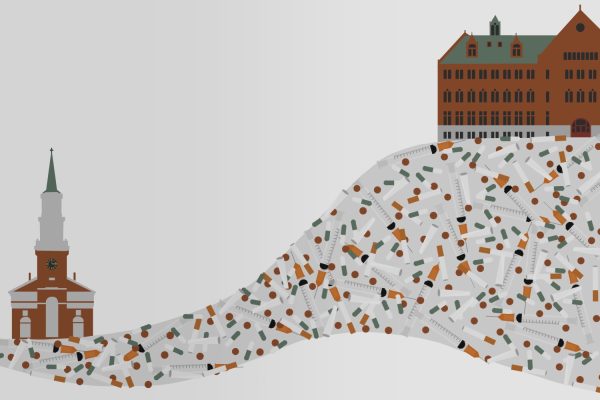Assisted suicide reaches State House
Point (Joseph Brown):
Recently the Vermont legislature has been considering a bill (S.77) that would legalize the practice of death with dignity, or patient-directed dying, or some other misleading euphemism conjured up by evidently abashed legislators.
Make no mistake: the bill would make killing another person legal, under the name of compassion.
The aforementioned bill states that a patient afflicted with a terminal illness, that is, an illness that affords its host less than six months to live, may be legally killed by a doctor, if they request medication to hasten death.
You probably hear appeals for state-approved suicide similar to this one all the time. But whatever the case, the amount of time a patient is told he has to live is irrelevant.
Medical experts admit that it is nearly impossible to predict when a patient will die of an illness. Moreover, some people diagnosed with a terminal condition do not die for years, and sometimes not at all (at least not of that particular condition).
The fact of the matter is that nobody can accurately predict when ones life becomes meaningless.
Euthanasia ideologues say legalizing assisted suicide would lower healthcare costs, as the drugs used to end a patients life are much cheaper than the drugs used to preserve it. This is not an ethically based argument. It argues that there is money to be saved by killing a patient, rather than actually helping one.
Advocates of euthanasia are naive if they do not believe that health-care providers wont urgeor paydoctors to, in turn, urge their patients to choose suicide over treatment.
Doctors might exaggerate the severity or dreadfulness of the ailment, as it would be in their financial interest to do so. Patients would be mindlessly receptive of a doctors deceptive advice, for people are unlikely to disagree with an expert.
Oregon, which has already legalized assisted suicide, has similarly witnessed this profits over people mentality.
Not long after the passage of the euthanasia bill, Oregon announced that it would make severe cuts to its state version of Medicaid. Oregon didnt use the money they saved to increase the quality of their healthcare; rather, the state pocketed the money.
The next fallacy in the argument of euthanasia advocates: that the choice to die would be strictly voluntary. It is foolish to deny the pressures that would exist to encourage a patient to choose death.
Poorer patients would be especially encouraged to choose death, lest they perceive themselves financial burdens to family members.
Or what of the patient who is depressed by his illness? Is he in a state of mind conducive to making such a decision?
Even in states which require that patients be in a mentally competent condition which is a nebulous requirement, to begin with in order make the choice to die, people can easily find loopholes in the law by substituting a doctor of a more Kevorkian nature for their primary physician, the latter of whom probably knows the patients medical condition better than the ideologically-bound death doctor.
More generally, how does consent make moral the practice of euthanasia? If I believe that my life is worthless, does the fact that Ive given my doctor consent to kill me make it morally acceptable when Im obliged accordingly? The presence of consent in this issue is irrelevant, as far as morality is concerned.
That Vermont lawmakers are even considering legalizing euthanasia is deeply disturbing.
I should hope that this measure is shot down in the legislature, as euthanasia does not, in fact, afford patients the choice to die. Rather, it allows the intellectual descendants of Dr. Jack Kevorkian the right to kill.
Counter-pooint (Josh Gachette):
It was an 1870 piece titled Euthanasia by businessman and teacher Samuel D. Williams that started a one-and-a-half-century long debate over physician-assisted suicide in the US.
Vermont State Senate Bill S 77 has brought it to our locality. The bill grants legal immunity to doctors who prescribe sleeping or pain medication to patients while warning them that taking an overdose will kill them and stipulating the amount that constitutes an overdose.
It also relieves the patients family members from being subject to civil or criminal penalties if they are with the patient when he takes the lethal dose and dies. Hopefully, the bill will successfully make its way through the House, and not face the fate of similar legislation from Massachusetts.
Early polls showed that M.A. voters mostly supported Question 2, the states version of medically assisted death. Yet the two groups lobbying in favor of the measure were out-spent by a five-to-one margin.
After a misinformation campaign launched by a coalition of national Catholic organizations, anti-abortion groups and the right-wing American Principles Project, Question 2 failed by about 68,000 votes a 51 to 49 percent vote.
To frame this debate as purely a moral one is absurd. The United States Conference of Catholic Bishops argues, Suicide is always as morally objectionable as murder. The Churchs tradition has always rejected it as a gravely evil choice. This ideology is neither specific nor substantial enough to be seriously considered in civic discourse.
But there are legitimate concerns raised by the opposition. Worries about a patients fragile mental state or overzealous relatives who seek to gain inheritance money come to mind. However, such concerns are addressed in the end-of-life bill. Seeing as to how Oregons Death With Dignity Act is the oldest of any such legislation and has survived numerous legal challenges, it can be used as a case study.
Under Oregon Ballot Measure 16 (1994) a competent adult Oregon resident who has a physicians diagnosis of a terminal illness, a life expectancy of fewer than six months and whose death does not have an effect upon a life, health, or accident insurance or annuity policy may request a prescription for a lethal dose of medication.
Any physician, pharmacist or healthcare provider who has moral objections may refuse to participate.
Two witnesses must then confirm the request; at least one who is not related to the patient, not entitled to any portion of the patients estate, is not the patients physician and is not employed by a health care facility caring for the patient.
Another physician then examines the patients medical records. The patient must wait at least 15 days and make a second oral request before the prescription may be written. If either physician suspects that depression or coercion is involved, the patient must be referred for a psychological evaluation.
Compassion in Dying v. Washington (1996), the United States 9th Circuit Court of Appeals notes the Conservative talking point of [protecting] the poor and minorities from exploitation. Empirical evidence reduces this anxiety.
An independent study published in the October 2007 issue of the Journal of Medical Ethics reports there was no evidence of heightened risk for the elderly, women, the uninsured, people with low educational status, the poor, the physically disabled or chronically ill, minors, people with psychiatric illnesses including depression, or racial or ethnic minorities, compared with background populations.
Dr. Ken Murray, professor of family medicine at the University of Southern California, supports legalizing physician-assisted suicide because of the needless suffering it spares the terminally ill.
He speaks to the fact that an overwhelming majority of his professional colleagues would want the option for themselves: Of course doctors dont want to die they want to live. But they know enough about modern medicine to know its limits.
I do not outrightly endorse suicide in the face of terminal illness. Instead, I respect the privacy of those affected and believe that they ought to be given comfortable legal parameters to manage their end-of-life matters on their own terms.
To fully grasp the subject at hand, I made a point of watching the video testimonial and death of an Oregonian named Roger Sanger.
Minutes before he ingests the concoction that will put in him into a coma and quietly kill him, he says I thank the wisdom of the voters of the state of Oregon for allowing me the honor or doing myself in on my own volition.
Just slipping out of consciousness, he manages a final utterance I hear the gentle voices calling. It was easy, folks. It was easy.






